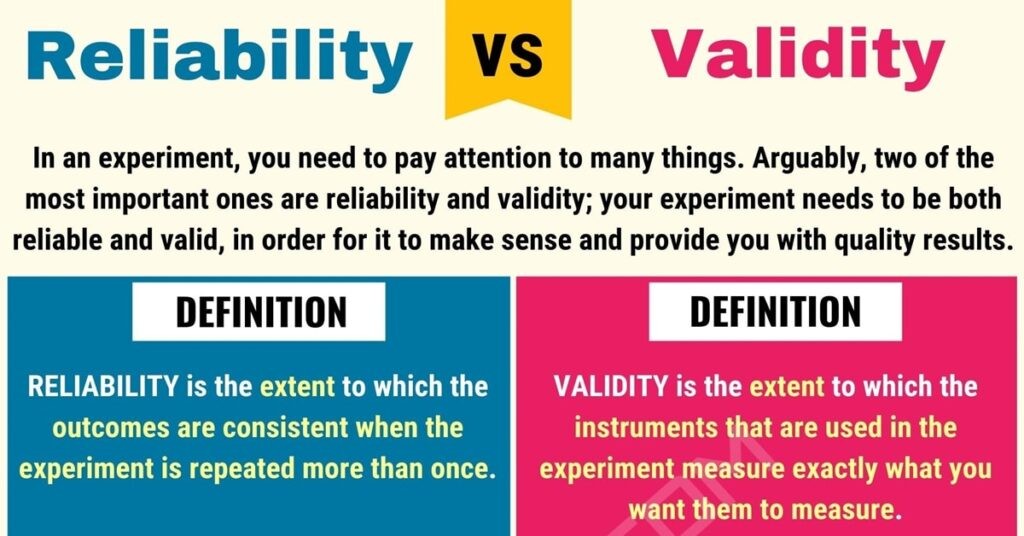
Differences between Validity and Reliability in Research
Validity and Reliability in Research
Validity and reliability are two important concepts in social research that help to assess the quality of research studies. They are both concepts used to evaluate the quality of research. They indicate how well a method, technique or test measures something.
1. Validity
Refers to how far a measure really measures the concept that it purports to measure.
As a measure of a research instrument or tool, validity is the degree to which it actually measures what it is supposed to measure (Wan, 2002).
Example of Validity
Suppose a researcher is conducting a study to determine whether a new medication is effective in treating a particular disease. The researcher would need to ensure that the study is measuring the effectiveness of the medication and not some other factor. If the study is well-designed and accurately measures the effectiveness of the medication, it would be considered valid.
Lack of Validity
If a study does not accurately measure what it claims to measure, it lacks validity. For example, if a researcher is studying the effectiveness of a new teaching method but the study actually measures student motivation, the study would lack validity.
2. Reliability
The reliability of a measure refers to its consistency, it is the extent to which an experiment, test, or any measuring procedure yields the same result on repeated trials.
Without the agreement of independent observers able to replicate research procedures, or the ability to use research tools and procedures that yield consistent measurements, researchers would be unable to satisfactorily draw conclusions, formulate theories, or make claims about the generalizability of their research. In addition to its important role in research, reliability is critical for many parts of our lives, including manufacturing, medicine, and sports.
Example of Reliability
Suppose a researcher is conducting a study to determine whether a new survey instrument is reliable in measuring job satisfaction. The researcher would need to ensure that the survey instrument produces consistent results over time and across different samples. If the survey instrument is well-designed and produces consistent results, it would be considered reliable.
Lack of Reliability
If a study does not produce consistent results over time and across different samples, it lacks reliability. For example, if a researcher is studying job satisfaction but the survey instrument produces different results each time it is administered, the study would lack reliability.
Why are reliability and validity important in social research?
The backbone of any social research lies in the validity and reliability of the data collected. These factors ensure the data accurately reflects the intended research objectives and is consistent and reproducible.
By carefully balancing the interrelationship between validity and reliability and using appropriate techniques to overcome challenges, researchers protect the credibility and impact of their work. This is essential in producing high-quality research that can withstand scrutiny and drive progress.
Knowledge of validity and reliability not only aids the researcher in designing and judging one’s own work, it also makes one a better consumer of research through the ability to evaluate research literature and in choosing among alternative research designs and interventions (Gliner & Morgan, 2000). Adopting these standards will ensure that study results are credible to your key constituents.
References
1. Shortell, S.M., Rundall, T.G. & Hsu, J. (2007). Improving Patient Care by Linking Evidence-Based Medicine and Evidence-Based Management. JAMA, 298(6), 673-676.
2. https://www.linkedin.com/pulse/importance-validity-reliability-michael-c-loyal-phd/
3. Wan, T.T.H. (2002). Evidenced-Based Health Care Management. Multivariate Modeling Approaches. Norwell, MA: Kluwer Academic Publishers.